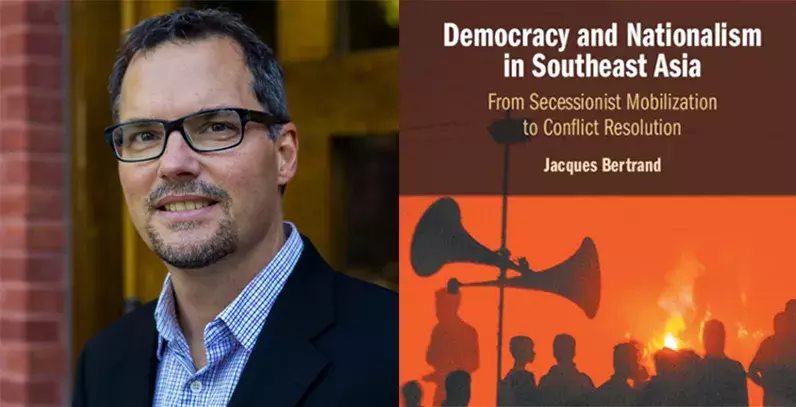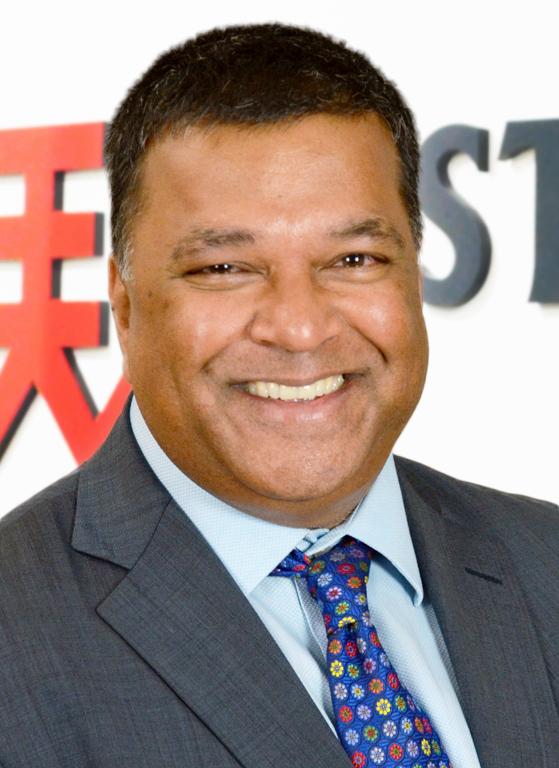Error message

The East-West Center in Washington invites you to a
Indo-Pacific Democratic Values and Human Rights Webinar:
Is Democracy Still Relevant to Reduce Secessionist Conflict?
Featuring:
Dr. Jacques Bertrand
Professor and Associate Chair (Graduate) of Political Science, University of Toronto &
Director, Collaborative Master’s Specialization, Contemporary East and Southeast Asian Studies, Asian Institute, Munk School of Global Affairs and Public Affairs
Dr. Satu P. Limaye (Moderator)
Vice President, East-West Center &
Director, East-West Center in Washington
East-West Center in Washington · Is Democracy Still Relevant to Reduce Secessionist Conflict?
In his latest book titled Democracy and Nationalist Struggles in Southeast Asia: From secessionist mobilization to conflict resolution, Dr. Jacques Bertrand offered a comparative-historical analysis of five nationalist conflicts over several decades. At a time when democracy appears to be receding in many parts of the world, including Asia, what can we learn from analyzing the sometimes-tenuous period of democracy in Southeast Asia in relation to violent nationalist mobilization? Dr. Bertrand spoke to challenges and debates on democracy’s impact on these conflicts. While democratization significantly reduces violent insurgency over time, it often introduces pernicious effects that can fail to resolve conflict and contribute to maintaining deep nationalist grievances. He offered some insights from cases in Indonesia, the Philippines, and Thailand, and examined the range of outcomes in the region from state repression for Malay Muslims in Thailand to relatively successful broad autonomy for Acehnese in Indonesia. Dr. Bertrand's PowerPoint is available for viewing.
SPEAKER BIOGRAPHIES

Jacques Bertrand is Professor and Associate Chair (Graduate) of Political Science at the University of Toronto, as well as Director of the Collaborative Master’s Specialization in Contemporary East and Southeast Asian Studies (Asian Institute, Munk School of Global Affairs and Public Affairs). He was the founding director of the Centre for Southeast Asian Studies at the Asian Institute. He has worked for many years on issues of ethnic conflict, nationalism and secessionism in Southeast Asia. He has recently co-founded the Postcor Lab (www.postcorlab.com) at the University of Toronto, a research hub for the study of post-conflict reintegration after civil war. His research has been funded by the Social Sciences and Humanities Research Council of Canada, the United States Institute of Peace, as well as the International Development Research Centre. He is the author of Winning by Process: The State and Neutralization of Ethnic Minorities in Myanmar (w/ Ardeth Thawnghmung and Alexandre Pelletier, Cornell UP, forthcoming 2022); Democracy and Nationalist Struggles in Southeast Asia: From secessionist mobilization to conflict resolution (Cambridge UP, 2021), Political Change in Southeast Asia (Cambridge, 2013) as well as Nationalism and Ethnic Conflict in Indonesia (Cambridge, 2004). He is also co-editor of Multination States in Asia: Accommodation or Resistance (Cambridge, 2010); and Democratization and Ethnic Minorities: Conflict or Compromise? (Routledge, 2014).

Satu P. Limaye is Vice President of the East-West Center and the Director of the East-West Center in Washington where he created and now directs the Asia Matters for America initiative and is the founding editor of the Asia Pacific Bulletin. He is also a Senior Advisor at CNA Corp (Center for Naval Analyses) and Senior Fellow on Asia History and Policy at the Foreign Policy Institute at Paul H. Nitze School of International Studies (SAIS). He is magna cum laude and Phi Beta Kappa graduate of Georgetown University and received his doctorate from Oxford University (Magdalen College) where he was a George C. Marshall Scholar. Recent publications include: “America’s ‘Pacific Principle’ in an Indivisible Pacific Islands Region,” (Asia Pacific Bulletin); “Despite Stumbles, America’s Engagement with Southeast Runs Deep,” (Global Asia); Raging Waters: China, India, Bangladesh, and Brahmaputra Water Politics (Marine Corps University Press); and Russia’s Peripheral Relevance to US-Indo Pacific Relations (Center for the National Interest).
The East-West Center in Washington invites you to a
Indo-Pacific Democratic Values and Human Rights Webinar:
Is Democracy Still Relevant to Reduce Secessionist Conflict?
Featuring:
Dr. Jacques Bertrand
Professor and Associate Chair (Graduate) of Political Science, University of Toronto &
Director, Collaborative Master’s Specialization, Contemporary East and Southeast Asian Studies, Asian Institute, Munk School of Global Affairs and Public Affairs
Dr. Satu P. Limaye (Moderator)
Vice President, East-West Center &
Director, East-West Center in Washington
East-West Center in Washington · Is Democracy Still Relevant to Reduce Secessionist Conflict?
In his latest book titled Democracy and Nationalist Struggles in Southeast Asia: From secessionist mobilization to conflict resolution, Dr. Jacques Bertrand offered a comparative-historical analysis of five nationalist conflicts over several decades. At a time when democracy appears to be receding in many parts of the world, including Asia, what can we learn from analyzing the sometimes-tenuous period of democracy in Southeast Asia in relation to violent nationalist mobilization? Dr. Bertrand spoke to challenges and debates on democracy’s impact on these conflicts. While democratization significantly reduces violent insurgency over time, it often introduces pernicious effects that can fail to resolve conflict and contribute to maintaining deep nationalist grievances. He offered some insights from cases in Indonesia, the Philippines, and Thailand, and examined the range of outcomes in the region from state repression for Malay Muslims in Thailand to relatively successful broad autonomy for Acehnese in Indonesia. Dr. Bertrand's PowerPoint is available for viewing.
SPEAKER BIOGRAPHIES

Jacques Bertrand is Professor and Associate Chair (Graduate) of Political Science at the University of Toronto, as well as Director of the Collaborative Master’s Specialization in Contemporary East and Southeast Asian Studies (Asian Institute, Munk School of Global Affairs and Public Affairs). He was the founding director of the Centre for Southeast Asian Studies at the Asian Institute. He has worked for many years on issues of ethnic conflict, nationalism and secessionism in Southeast Asia. He has recently co-founded the Postcor Lab (www.postcorlab.com) at the University of Toronto, a research hub for the study of post-conflict reintegration after civil war. His research has been funded by the Social Sciences and Humanities Research Council of Canada, the United States Institute of Peace, as well as the International Development Research Centre. He is the author of Winning by Process: The State and Neutralization of Ethnic Minorities in Myanmar (w/ Ardeth Thawnghmung and Alexandre Pelletier, Cornell UP, forthcoming 2022); Democracy and Nationalist Struggles in Southeast Asia: From secessionist mobilization to conflict resolution (Cambridge UP, 2021), Political Change in Southeast Asia (Cambridge, 2013) as well as Nationalism and Ethnic Conflict in Indonesia (Cambridge, 2004). He is also co-editor of Multination States in Asia: Accommodation or Resistance (Cambridge, 2010); and Democratization and Ethnic Minorities: Conflict or Compromise? (Routledge, 2014).

Satu P. Limaye is Vice President of the East-West Center and the Director of the East-West Center in Washington where he created and now directs the Asia Matters for America initiative and is the founding editor of the Asia Pacific Bulletin. He is also a Senior Advisor at CNA Corp (Center for Naval Analyses) and Senior Fellow on Asia History and Policy at the Foreign Policy Institute at Paul H. Nitze School of International Studies (SAIS). He is magna cum laude and Phi Beta Kappa graduate of Georgetown University and received his doctorate from Oxford University (Magdalen College) where he was a George C. Marshall Scholar. Recent publications include: “America’s ‘Pacific Principle’ in an Indivisible Pacific Islands Region,” (Asia Pacific Bulletin); “Despite Stumbles, America’s Engagement with Southeast Runs Deep,” (Global Asia); Raging Waters: China, India, Bangladesh, and Brahmaputra Water Politics (Marine Corps University Press); and Russia’s Peripheral Relevance to US-Indo Pacific Relations (Center for the National Interest).








